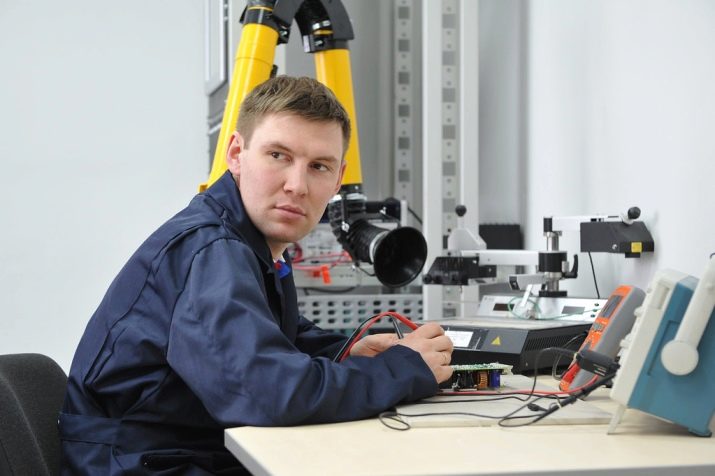An electronic engineer at the enterprise is responsible for the development, installation, as well as the commissioning and launch of electronic equipment. This profession is most suitable for those specialists who are interested in mathematics, computer science and physics. Let us dwell on the characteristics of this specialty and the basic requirements that apply to the profession.
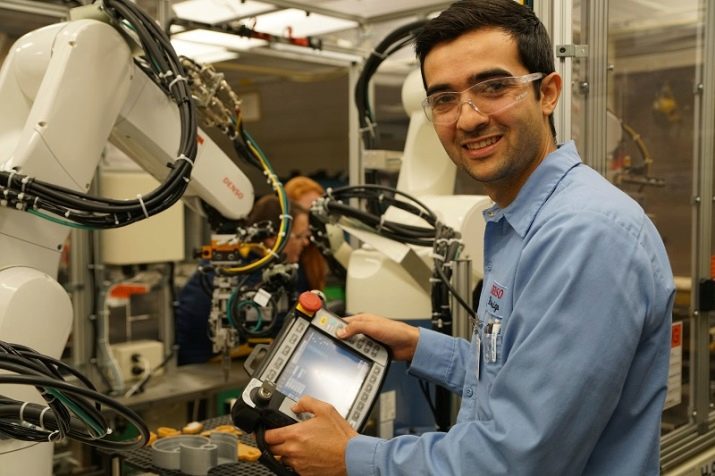
Who is that?
In any manufacturing company, an electronic engineer He is responsible for the implementation of a whole range of diverse tasks, ranging from the development of electronic equipment to monitoring its operation. Engineers of this specialization are well aware of all the features of the operation of electronic equipment and the nature of electrical processes. Electronic engineers are in demand in various fields, this position can be found in the staff list of production, scientific, design, trading companies and even in schools.
One of the main responsibilities of an electronics engineer is development of the latest products. Most existing electronic firms rely on the expertise of these professionals to market new products and distribute existing ones. These products include gaming installations, watches, TV sets and many other types of electrical devices. These specialists are required skills to develop parts of electrical systems for production.
The vast majority of electronic engineers work in private structures, however, a large percentage of them also work in public institutions.

An electronics engineer works closely with other departments in the same enterprise.. He passes on his ideas and initiatives to other workers so that they can use them in practice. This means that a person in this position is required to be able to establish effective working contacts - only in this case he can make sure that all projects and initiatives are used in the right direction and in the right context.
Studying job listings, you will notice that the aforementioned position is often called differently, it can be an CEA developer, a PCB designer, and also an electrical engineer. It should be noted that at different enterprises different requirements are set for electronic engineers, various tasks are set and a different area of responsibility is outlined, therefore it is almost impossible to find two specialists with identical work experience.
However, for the most part they perform similar tasks and use common principles in their activities.
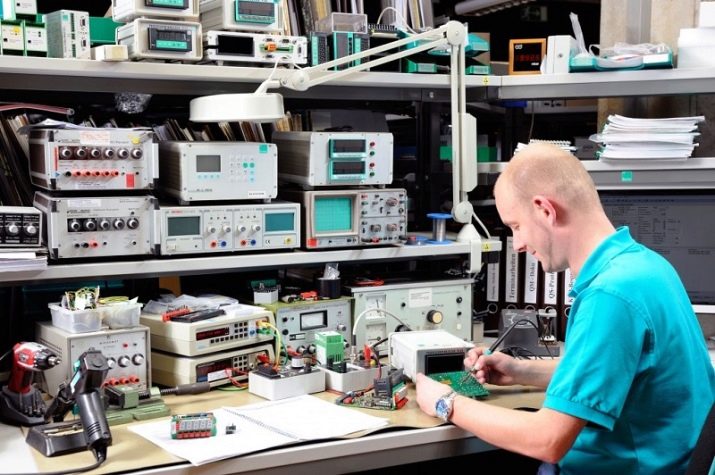
Pros and cons of the profession
Like any other specialty, the position of an electronic engineer has both its advantages and its shortcomings. The pluses include:
- high demand in the modern labor market and good prospects for the development of the profession in the near future;
- high salary for skilled workers;
- the possibility of continuous professional self-development.
Not without drawbacks - they are primarily associated with the fact that the world of electrical and electronic equipment is in constant dynamic update, therefore an electronic engineer must always be in the know about all the new products on the market, the achievements of domestic and Western science. Accordingly, this person should devote a lot of time to his own self-development, as a rule, he has to do this in his spare time from work.
However, some experts believe that this is an advantage of the profession, rather than its disadvantage.
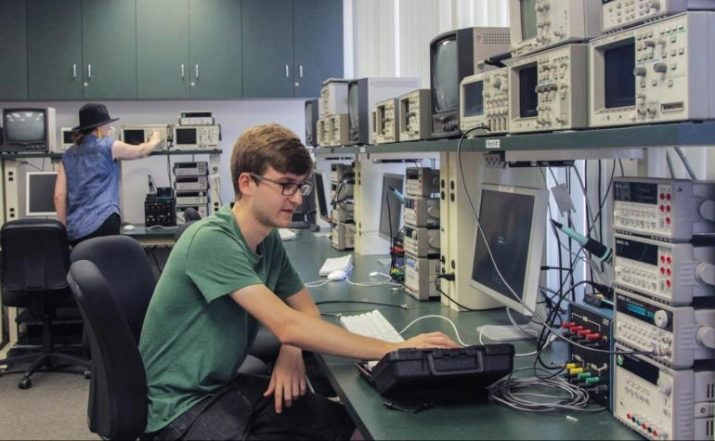
Specializations
Depending on the direction of the enterprise, The position of an electronics engineer is divided into several areas:
- system engineering;
- circuitry;
- design.
System Engineering Specialists must demonstrate breadth of thinking, show a systematic approach to resolving emerging problems of radio electronics. System engineers are engaged in the design, development and implementation of electronic and radio equipment systems with certain parameters.
However, their tasks do not include complete immersion in the structure of each individual mechanism.

Circuitry, in contrast, should as detailed as possible to understand the design of each device. Their tasks include the design of working subsystems with specified parameters. In other words, this person solves small local issues. His competence does not include the tasks of complex application of the equipment developed by him.
Design engineers make calculations aimed at solving problems of optimizing working circuits; they spend all their energy on creating the most compact and miniature devices. In addition, their responsibilities include solving technical issues, for example, heat removal and cooling of functioning installations, designing modules of electronic equipment, fiber-optic and other engineering systems that contribute to maintaining the functionality of an existing enterprise.

Job responsibilities
In accordance with the ECTS, which defines professional standards and job descriptions, an employee occupying the position of an electronic engineer must perform the following functions:
- ensuring the correct operation of electronic equipment, the organization of its continuous operation;
- participation in the planning of repair of devices and their maintenance, as well as scheduling measures to improve the parameters of their operation and increase the efficiency of existing electrical electrical installations;
- the preparation of computers for work, inspection of its individual parts and assemblies;
- monitoring the degree of reliability of all electronic machinery mechanisms, as well as carrying out test tests with the goal of promptly detecting defects and malfunctions, organizing work to eliminate them;
- commissioning and tuning of computers, as well as individual parts of electronic equipment;
- maintenance of electrical equipment, ensuring its maintenance in good condition;
- testing the possibility of connecting third-party additional installations to the electronic computing systems of the company in order to increase their functional and technical capabilities;
- data collection and analysis of the use of electrical equipment;
- making recommendations on changing operating modes and equipment maintenance standards;
- if necessary - execution of applications for the purchase of electronic and radio equipment and spare parts for it;
- full control over maintaining proper storage conditions for electrical appliances.
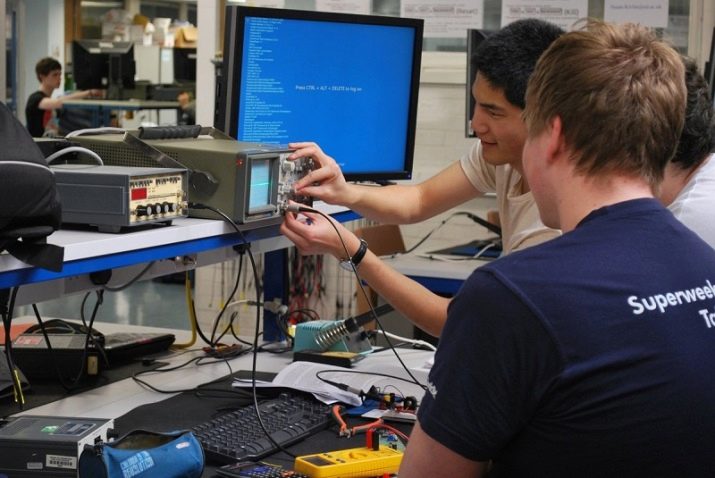
Requirements
Personal qualities
To successfully occupy the position of an electronic engineer, the candidate must have a whole set of personal qualities:
- interest in working with electronics and radio engineering;
- technical mindset;
- constant striving for self-improvement, improvement of existing professional skills;
- scrupulousness;
- high stress resistance;
- pedantry and accuracy;
- ability to analyze large amounts of data.
We pay attention to the fact that there are some pathological health conditions that may be grounds for refusing approval for the position of electronic engineer. In particular, they include vision problems and lack of finger motility.
In addition, any diseases of a neurological nature, as well as problems that are characterized by periodic loss of consciousness, will also not allow the employee to perform the necessary labor functions.
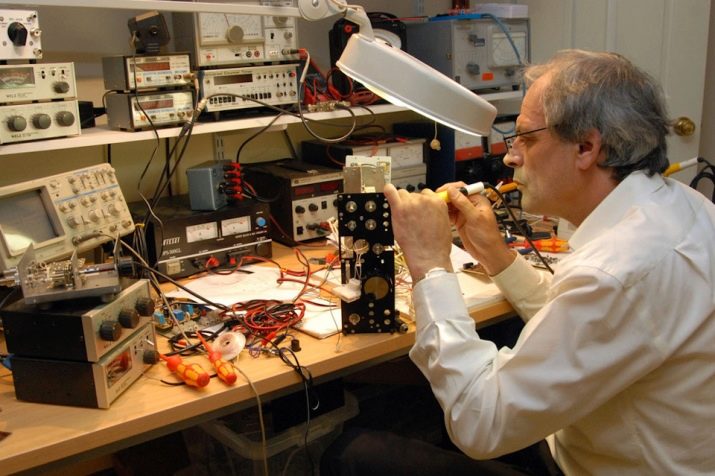
Professional skills
An electronic engineer must have good working skills with such computer programs: CAD, Altium Designer, Kompas 3D, TINA, Cadence, LtSpice, Protel DXP. In order to successfully perform his duties, this specialist must know:
- current orders, decrees, as well as other regulatory and methodological documents relating to the operation of any electronic equipment;
- technical and operational parameters, design features and acceptable operating modes of electronic devices;
- methodology for processing arrays of information;
- basics of programming;
- methodology for compiling current and future plans;
- rules for drawing up official reports on the implementation of established work schedules;
- principles of organization of maintenance and repair of electrical appliances;
- advanced Russian and international experience in servicing radio-electronic equipment at the enterprise;
- standard plan for the formation of applications for the purchase of equipment, as well as its spare parts.
Since an electronic engineer belongs to a group of senior employees, it is important that he knows the basics of the economy, the principles of ergonomics, the competent organization of labor and production processes at the enterprise.
Any specialist who belongs to the category of engineers is required to know the norms in the field of labor protection, as well as the rules of industrial and fire safety.
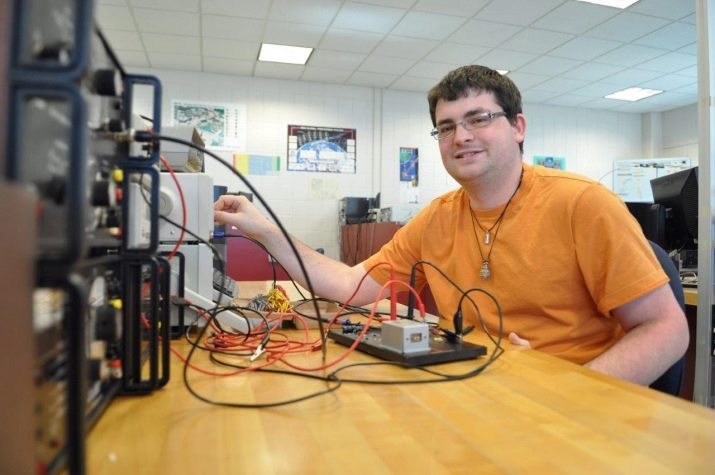
Training and career
An electronics engineer can work in a wide variety of enterprises with the following focus:
- research and production and industrial companies for the creation and production of electronic equipment;
- specialized research institutes;
- electronic and computer equipment repair companies;
- service centers.
An employee with a higher education in the technical field can be assigned to the position of an electronic engineer without any requirements for the length of service in this specialty. However, this vacancy can be taken by an employee with a secondary specialized education (technical college or technical school). But the applicant who has not graduated from a specialized university should have at least 3 years work experience as a technician or work experience in other technical specialties for at least 5 years.
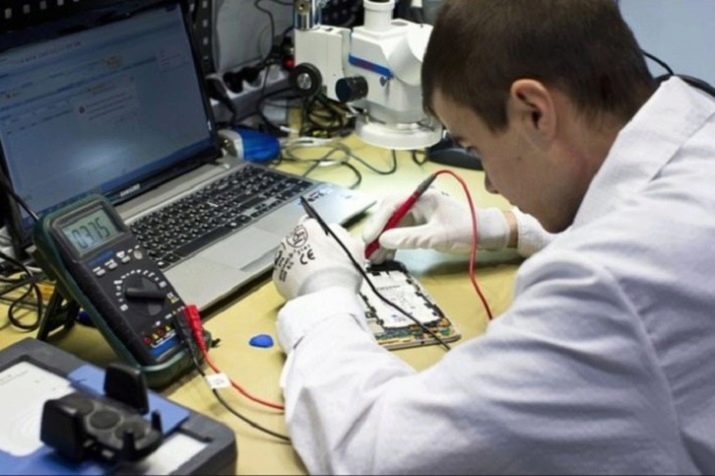
Depending on the functional classification, several categories of employees are distinguished as electronic engineer.
- Electronic Engineer 3 categories. Represents an employee with higher technical education, as well as work experience acquired during training or having work experience in technical positions without a specific qualification.
- Electronic Engineer 2 categories. This is a person with higher specialized education, as well as experience in the position of an electronic engineer of category 3 for at least 3 years.
- Category 1 Electronic Engineer. An employee with a higher professional education, as well as work experience as an electronic engineer of category 2 from 3 years or more.
Obviously, the greatest prospects in terms of career and wages are specialists with higher education and experience in the engineering position. That is why many students of technical institutes, even at the time of training, get settled in the experimental laboratories of the enterprise. Thus, having received a diploma, they already have some work experience, which allows them to apply for the position of an engineer of the lower qualification category. And after 3-5 years, they can apply for the transfer to the highest professional level of a leading electronic engineer.
